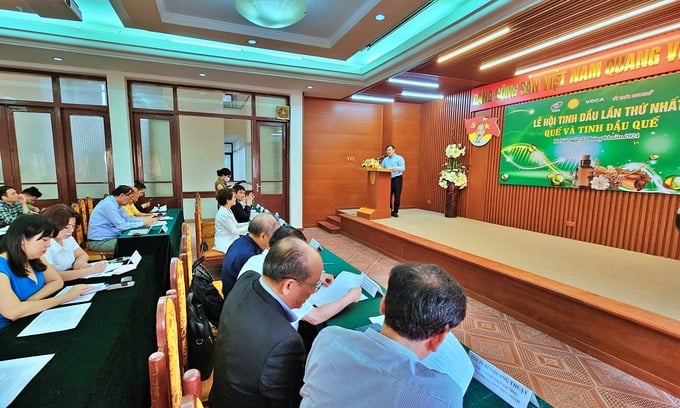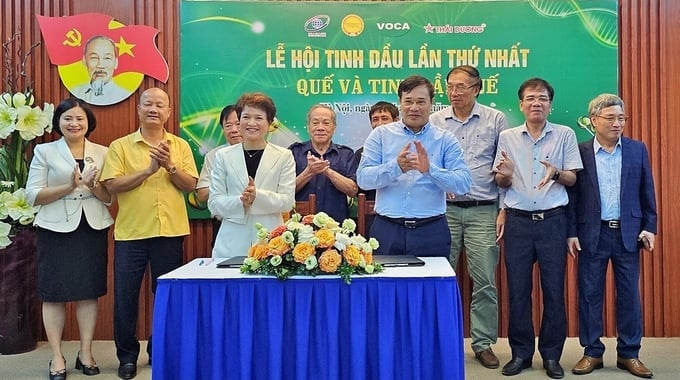June 16, 2025 | 18:56 GMT +7
June 16, 2025 | 18:56 GMT +7
Hotline: 0913.378.918
June 16, 2025 | 18:56 GMT +7
Hotline: 0913.378.918

Opening ceremony of "Essential Oil Festival" on April 25. Photo: Bao Thang.
According to statistics from the Vietnam Association of Oils, Aromas and Cosmetics (VOCA), the country currently has about 180,000 hectares of cinnamon growing land, concentrated mainly in the Northern and North Central mountainous areas. Cinnamon export turnover reached USD 260 million in 2023.
Vietnam is considered the "cinnamon capital" of the world, but cinnamon industry businesses face many difficulties and challenges in improving product value, especially the production of cinnamon essential oil.
Dr. Bui Thi Bich Ngoc, Food Industries Research Institute (FIRI), listed six reasons. In particular, she emphasized the challenge of accessing the global market, the need for more skilled and specialized human resources, and the incomplete production process.
"Cinnamon essential oil was previously often obtained from cinnamon bark, but recently, it is mainly extracted from leaves and young branches or by-products of making finished cinnamon bark. Our cinnamon essential oil distillation technology has been upgraded but is still not high," Mrs. Ngoc said.
Mr. Bu Ngoc San, Director of Son Hai Company - a handmade cinnamon essential oil processing enterprise in Bao Yen district (Lao Cai province), admitted that currently, where he lives, there is almost no room left to develop cinnamon growing after The area has continuously expanded over the past ten years.
From actual production, Mr. San said no large enterprises are processing cinnamon bark. The amount of essential oil produced and processed for the market largely depends on the people's experience. Scaling up is also tricky because essential oil processing requires significant capital.
"If harvested at the end of the cycle, cinnamon can yield up to VND 600 million per hectare, much higher than growing acacia. From the 4th year, cinnamon has been harvested. However, I am still wondering how to harvest it and calculate the optimal cycle of pruning branches and leaves," Mr. San expressed.

VOCA and VST signed a memorandum of cooperation. Photo: Bao Thang.
Faced with these issues, within the first "Essential Oil Festival" framework, VOCA signed a cooperation agreement with the Vietnam Association of Science and Technology Enterprises (VST) to help organizations, individuals, and businesses. Businesses related to the cinnamon industry have more knowledge, experience, and market access.
Dr. Ngo Dai Quang, Vice President and General Secretary of VOCA, hopes that Vietnam's cinnamon essential oil industry will gradually have a solid foothold in the international market. "We learn from each other's experiences and apply them to production practices, thereby meeting quality requirements when exporting cinnamon essential oil," he shared.
Also, according to Mr. Quang, the "Essential Oil Festival" has a significant meaning because this is the first time the issues of cinnamon essential oil, from the current situation, difficulties, and solutions will be associated with the specific action.
The cinnamon essential oil industry has excellent development potential because the world's demand for cinnamon essential oil is increasing, and the supply is always insufficient. The reason is that cinnamon is only commonly grown in a few Asian countries, including Vietnam.
"Essential Oil Festival" is an activity in the series of events exhibiting science, technology, and innovation products to respond to and celebrate the 65th anniversary of the establishment of Vietnam's science and technology industry from April 24 - 26.
In early April 2024, due to problems with export regulations, hundreds of tons of cinnamon essential oil were left in stock in Lao Cai and Yen Bai provinces. The Vietnam Pepper and Spice Association (VPSA) has sent a document to the Prime Minister proposing to consider, remove, and support the resolution of difficulties.
Translated by Huong Giang

(VAN) The working delegation from the Ministry of Agriculture and Environment conducted an important trip to the Netherlands to strengthen strategic partnerships and sustainable development in the agricultural sector.

(VAN) The letter ‘A Plea from the Ocean’ not only evokes emotion but also awakens the human conscience to the responsibility of protecting life on Earth.

(VAN) The Department of Agriculture in South Africa has announced the country’s first mass vaccination of poultry to prevent local birds from contracting avian influenza.

(VAN) Establishment of the Mekong Delta Regional Agricultural Linkage Center, aiming for a closed value chain, deep processing, trading platforms, and international market connectivity.

(VAN) Gia Lai province has recently recorded 460 rare species of animals and plants, contributing to forest conservation and biodiversity planning in the region.

(VAN) Ms. Caroline Beresford, New Zealand Ambassador to Vietnam, expressed confidence that agricultural cooperation between Vietnam and New Zealand will develop sustainably, be climate-resilient, and promote gender equality.

(VAN) Vietnam reaffirms its commitment to international cooperation in fostering sustainable and responsible fisheries while ensuring resilient livelihoods for small-scale fishing communities.